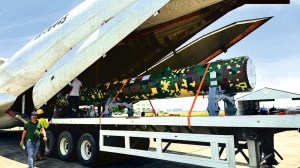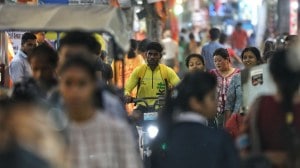- India
- International
What doctors want: A reality check
The Indian Express does a reality check into six of the doctors' most common demands.
 At LNJP Hospital during the strike. (Source: Express Photo by Purushottam Sharma)
At LNJP Hospital during the strike. (Source: Express Photo by Purushottam Sharma)A day after 2,000 resident doctors called off their two-day strike after assurances from the government to look into their demands, The Indian Express does a reality check into six of their most common demands, what the Health Department under the previous government did to manage these issues, and the promises made by the present government to address them.
Security in hospitals
As doctors frequently get roughed up by families of angry patients, they have been demanding better security in the emergency wards and labour rooms. The Delhi government said it will post homegaurds in “critical areas” and will take up the matter of posting police personnel on a “priority” basis.
Former Delhi health minister Dr A K Walia said when strikes occurred in medical colleges like Maulana Azad Medical College (MAMC) during his tenure, the government had put up barricades near the emergency ward and opened a single gate manned by guards. “We had also put up notices in Hindi stating that strict action will be taken if any patient’s kin argue or hit a doctor. Guards had been instructed to allow only a single relative to enter the emergency ward,” he said.
[related-post]
REALITY CHECK: While emergency wards in some hospitals such as Lok Nayak (LN) hospital have a barricade near the ward, it is pushed aside during peak hours. Though all government hospitals have a police chowki, doctors said the chowkidars do not come when they are called. “We had demanded that at least one policeman be posted outside the labour room, gynaecology and emergency wards, but no one is available. When the crowd gets rowdy, a single policeman or hospital guard is simply not able to stop them,” a resident doctor at
LN hospital said. In most hospitals, however, there are no barricades and one or two security guards from private agencies are stationed at emergency gates. Doctors said notices which were put up at MAMC warning patients against roughing up doctors were just printouts on A4-size papers that were torn within days and never replaced.
Regular duty hours for resident doctors

The Delhi government said this would be fixed at 12 hours. If doctors work longer during emergency cases, medical superintendents will inform the health secretary and the doctors will get a compensatory off.
Dr Walia said while this was never brought to him as an issue before any strike, it was taken up when doctors raised it in “regular meetings” with medical superintendents. “Hospital authorities were instructed to make duty rosters in advance to maintain transparency and ensure no one was exploited by being made to work particularly long hours,” he said.
REALITY CHECK: Resident doctors said seniors are called in during odd hours. “We have to work anywhere between 24 and 36 hours at a stretch on a regular basis. We work at least 100 hours a week and are expected to find time to study in between. There are no compensatory offs given. If we complain to a medical superintendent, the head of the department takes it out on us. Rosters are just an eye-wash as no department follows them,” a senior resident doctor at Safdarjung hospital said.
Provision of clean, safe drinking water
Doctors who work long hours have to get their own or buy water as there are no water- dispensing systems. The Delhi government has now said dispensers will be set up in all hospitals within seven days. Dr Walia said water dispensers had been set up but were not maintained.
REALITY CHECK: No hospital under the Delhi government has any provision of drinking water for doctors, resident doctors said. “The water dispensers in wards meant for patients are also not maintained. I do not know of any hospital which has this facility. In some hospitals, residents and department doctors pool in money and buy a large mineral water container,” a senior resident of RML hospital said.
Facilities in doctors’ duty rooms, general and emergency wards, hostel and canteen services
The Delhi government said doctors’ duty rooms will be renovated every three months and medical superintendents will take action in a “time-bound manner” on the other issues.
Dr Walia said, “A lot of our upgradation and maintenance was delayed due to the pace of PWD work. Now, the health minister is also the PWD minister, so facilities like proper rooms for doctors to sit and rest should not be a problem.”
REALITY CHECK: Doctors said let alone duty rooms in emergencies, even in outpatient departments around five-six doctors sit in one room in many government hospitals. “The locks don’t work in the duty rooms in emergency wards. People walk in when doctors are resting. The sheets are also not clean and the walls are peeling off,” a resident doctor at LN hospital said. Doctors said the condition is particularly bad in emergency wards. A doctor at Guru Teg Bahadur hospital said, “There is water seeping in through the walls and the room stinks. If private rooms for patients are unoccupied or the nearby ward duty rooms are free, we go and catch a nap there,” a doctor said.
Providing generic drugs, equipment, provisions in operation theatres
The Delhi government said 80 per cent of drugs are available in hospitals and by August 15, all drugs would be made available. A survey will be undertaken to take stock of the operation theatres and non- functional OTs would be made functional in two months’ time, it said.
Dr Walia said the Congress government had addressed these issues in a “hospital-specific manner”. “We made sure drug and equipment purchase was kept up to date,” he said.
REALITY CHECK: “If a doctor writes a prescription for a branded medicine and tells the patient to purchase it from a chemist outside, relatives get angry. But if we know generic drugs are not available what can we do?” a doctor at LN hospital said. During the swine flu outbreak, doctors said there was a shortage of protective masks. “When we are managing infectious cases like HIV and viral hepatitis, protective gowns and gloves are not provided. If the patient is asked to purchase these, we are blamed. If we turn away patients for lack of equipment, we are blamed,” a resident at GTB hospital said.
Patient-to-bed ratio
With hospital facilities unable to keep up the patient inflow, almost all hospitals have to admit more than one patient to a bed. The Delhi government has said the bed capacity in hospitals will be doubled in 30 months.
Walia said the present government has not moved ahead in setting up new infrastructure that the Congress had started. “For the two super-specialty hospitals in Tahirpur and Janakpuri, we had set up societies and appointed directors. No appointments have been made after that,” he said.
REALITY CHECK: Doctors said when there is an outbreak of diseases such as dengue, they have to accommodate three patients to a bed. “We cannot keep up with the demand even then. We have to lay out sheets or mattresses on the floor and set up patients on IV drips. Patients and their kin get angry then and think they are not being treated well,” a doctor at Safdarjung hospital said. In gynaecology wards, it is very common for two pregnant women to be accommodated on a single bed.
Apr 20: Latest News
- 01
- 02
- 03
- 04
- 05





























